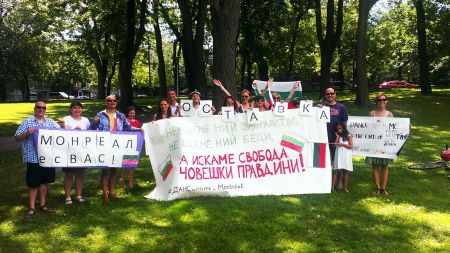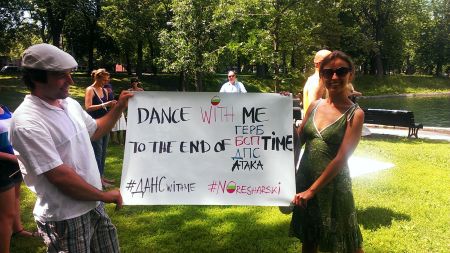MONTREAL--Montrealers joined people in 25 cities around the world on Sunday for #ДАНСwithme Global, in solidarity with 30 straight days of protest in Bulgaria. The Bulgarian demonstrations against government corruption are being held nightly in front of the parliament buildings in the capital Sofia, and have grown to as many as 50,000 people.
"We're taking part in this global initiative to support our friends in Bulgaria, our nation which is struggling and fighting against corruption, against the oligarchy," said Raina Alexandrova who organized the rally in Parc Lafontaine, which drew around 25 people. "What we have in Bulgaria now is a very strong mafia and oligarchy who are basically directing the government in all the decisions they take. They are not taken for the people, they are taken just for the sake of someone else to make [a lot of] money.
#ДАНСwithme Global translates to "#DANSWithMe", or "dance with me", a pun that was developed to gain social media traction for the protest movement in Bulgaria. DANS is Bulgaria's State Agency for National Security. In June, Bulgarian Prime Minister Plamen Oresharski appointed media mogul Delyan Peevski as head of DANS. The move, according to Bulgarian Montrealer Svetla Turnin, was the "drop that made the glass overflow."
"People were not going to let this [appointment] slide because there have been criminal charges against [Peevski] in the past, his mother runs a fairly powerful, fairly big, media empire," Turnin said. Peevski faced investigations for corruption at the age of 25, shortly after he was appointed to cabinet. While the charges were dropped, Bulgaria has been criticized by the European Commission for never once prosecuting a high-level government official. Peevski resigned his position at DANS just one day after his appointment.
These protests are not about one incident, though. Bulgarians are fed up with a history of government corruption and lack of transparency that has persisted, said Turnin, since the fall of the USSR 23 years ago. Others at the protest echoed her feelings.
"We're here today because for a long time it's been a politic of corruption and mafia control that has imposed itself onto the political life in Bulgaria," said Svetoslav, another Bulgarian Montrealer. "The past 23 years were supposed to be a time of transition, but there have been no changes during that time. There have been a number of governments, but each one of them imposes divisiveness. They are basically operating on a principle of divide and conquer."
Protests in February, primarily over rising energy prices and low wages, brought down the previous coalition government and led to new elections. But many see the new government as a continuation, saying they too are working in favor of the oligarchs and mafia and not on the side of ordinary Bulgarians.
While the protesters' main demand is the resignation of the government and new elections, there are also questions about how to ensure that the next government that is representative of the popular will and is not also tied to corruption. Only 51 per cent of Bulgarians voted in the last elections, and a full 20 per cent of ballots had no impact on the composition of their parliament, since they were cast for smaller parties that did not make the minimum cut-off to hold a seat.
The result is a growing sense of disillusionment, said Turnin, that may only be solved with electoral reform. The current government is trying to buy time by saying they will bring in such reforms, "but the longer they stay in power, the more they vote in worse legislation, which is not in the best interest of the country," she explained.
Svetoslav and Turnin both see the ongoing protests in other parts of the world--especially in Turkey--as having an influence in inspiring the Bulgarians. And despite the difficulties in fighting pervasive corruption, there is also a growing civil society and protest movement that is making change.
"To me, it feels like a lot of Bulgarians have been complacent for the past 23 years, but in the last five or six years, there's been the formation of a strong environmental movement coming together around issues of fracking, mines and nuclear energy. So there's been the beginning of civil society and I feel like that has empowered people," said Turnin. "Many of the people who are out at the protests now were out at protests last summer to protect the mountains from developers, our national parks from rampant development."
And for now, they seem to plan to stay out in the streets.
"The protests will keep going on in Bulgaria until there is a resignation of the government," said Alexandrova, "and here we will do the same."
For updates on upcoming Montreal solidarity actions, visit: https://www.facebook.com/events/420064871442889/ or https://www.facebook.com/events/208806839272933.
Tim McSorley is an editor with the Media Co-op and a member of the Montreal Media Co-op collective.





